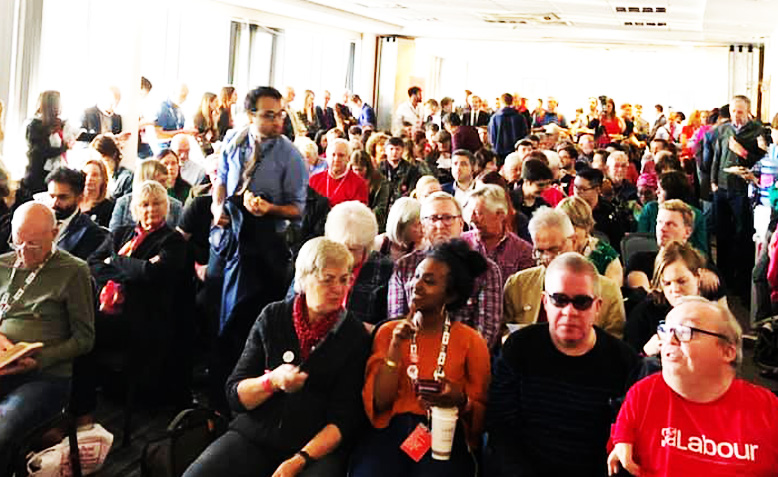 'Why we need an anti-war government' Stop the War fringe meeting at Labour Party Conference 2018. Photo: Stop the War
'Why we need an anti-war government' Stop the War fringe meeting at Labour Party Conference 2018. Photo: Stop the War
The left has seen a number of defeats at Labour Conference, but on the ground, there is burgeoning resistance, writes Chris Nineham
One of the encouraging things about Labour Conference is that it is starting to look a bit more like the membership. Whereas two years ago in Liverpool there was a big bloc hostile to Corbyn, this time round Corbynism is more mainstream on the conference floor.
The massive influx of new members and the general radicalisation is making its mark. On the fringe, Momentum’s The World Transformed is multiple times bigger than at its outings previous. 250 packed into the Palestine Solidarity Campaign fringe, the Stop the War meeting had similar numbers and scores were turned away, and there have been big meetings against the witch-hunts over antisemitism and many more.
The paradox is that despite this radicalisation so far the conference has been disappointing for the left. On the first day, the more radical proposals of the democracy commission were voted down. Open selection has been watered down to a trigger ballot arrangement which comes with significant hurdles.
Most worryingly there has been a setback for the left in the way the party leader is selected. The new system requires candidates to get the backing of at least 10% of MPs and 5% of either the affiliates, dominated by the unions, or the constituency parties. The 10% MP threshold, in particular, will make it extremely difficult for someone as left wing as Jeremy Corbyn to be elected again with anything like the current balance in the Parliamentary Labour Party. The fact that local open selection has not been won makes this a bigger blow.
So what is going on? The energy and radicalism of the Corbyn surge is coming up against some of the obstacles to radical change built into the Labour Party. The modifications to the democracy commission have been argued for by the leadership of the big five unions, three of which are far from enthusiastic about Corbyn. Even with a more left wing CLP element, the union vote is still dominant at the NEC and at conference where they wield massive bloc votes. Meanwhile, the number of committed Corbyn supporters in the PLP remains small. The Labour right has always rested on an alliance between right wing trade union leaders and the bulk of the Parliamentary Party.
Senior Labour figures, including Emily Thornberry and John Trickett, have been touring the fringe putting an argument for unity at all costs as the Tories’ crisis deepens. But what conference shows so far is that there is still a struggle going on over the future direction of the party and there is huge pressure for the left to make more concessions. It shows as well that while progress has been made internally, further advances for the Corbyn project will require more than just internal pressure. Corbynism has its roots in widespread disaffection with politics as usual. It has thrived on the basis of mass rallies and the mobilisation of the wider movements. Those mobilisations are going to remain crucial in the months to come.

